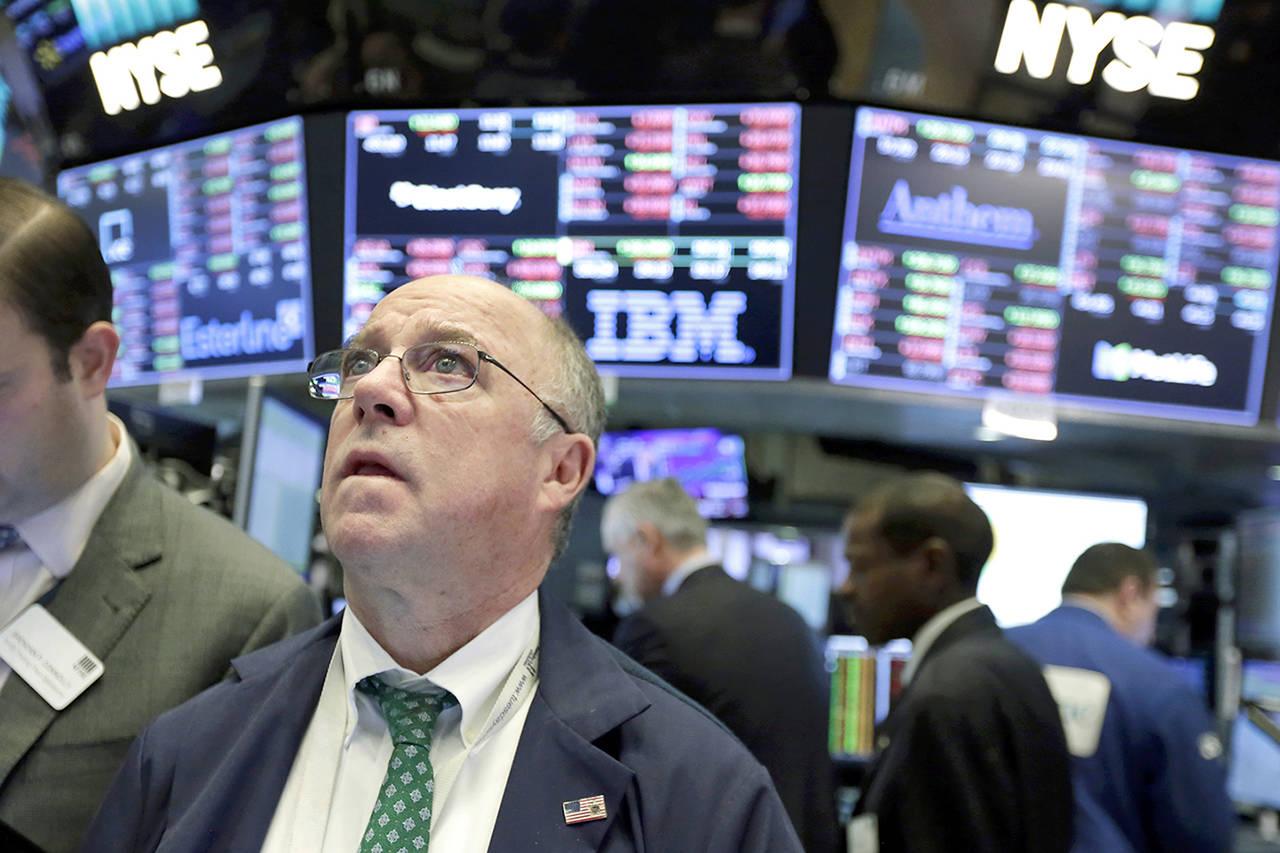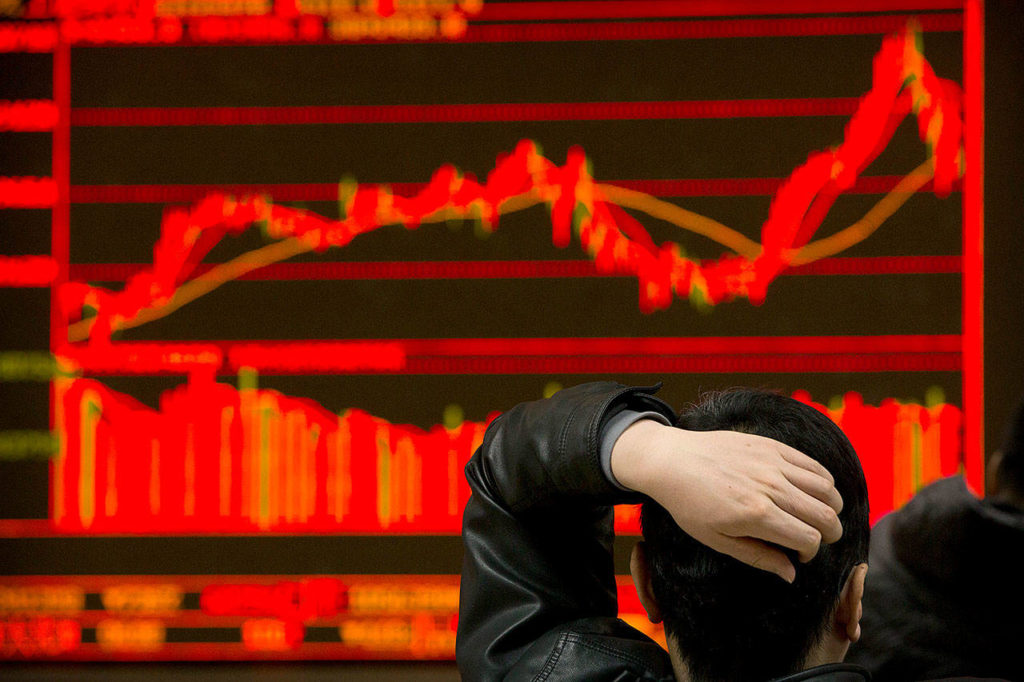By Steven Mufson, William Booth and Thomas Heath / The Washington Post
U.S. stocks bounced up in the final hour of trading Tuesday after a rocky morning that saw the Dow Jones industrial average dip into correction territory.
After a big swing of more than 1,168 points during the day, the Dow landed up 2.3 percent, or 567 points, to finish at 24,914.
“Volatility is back,” said Jamie Cox of Harris Financial Group. “It’s not back in a big way, but it’s not going to be dormant like it was in 2017. That’s the real story.”
While navigating volatile trading, money managers urged investors to keep calm and noted that the U.S. and global economies remain strong. On Tuesday, major companies reported another round of strong profits, with General Motors, BP, Allergan, health-care companies and others beating analysts’ expectations.
Veteran traders and stock strategists say the slide in stock prices over the past week is a natural dip. The market had run up too high, too fast and needed to let off some steam, they say.
Federal Reserve Bank of St. Louis President James Bullard said after a speech in Lexington, Kentucky, that “this is the most predicted sell-off of all time because the markets have been up so much and they have had so many days in a row without meaningful down days,” Bloomberg News reported.
Bullard played down the risk of inflation, saying that data Friday showing a jump in average hourly earnings did not mean the economy was on the verge of a resurgence of inflation. He said other measures of wages were more restrained, Bloomberg reported.
Yet the markets remained nervous as exchanges in Asia and Europe plunged after Monday’s record single-day 1,175-point drop in the Dow, renewing questions about whether the long-running stock rally is heading for a rout that might undercut President Trump’s frequent boasts claiming credit for the markets’ rise.
“I think you’ve seen a normal market correction, although large,” Treasury Secretary Steven Mnuchin said Tuesday at a House Financial Services Committee hearing. He said that computer trading algorithms made the market drop Monday worse. “It definitely had an impact on market moves,” he said.
Nonetheless, Mnuchin added that “I’m not overly concerned about the market volatility. I think the fundamentals are quite strong.”
Asked whether the administration would take responsibility for downturns as well as increases in the stock market, Mnuchin said, “We’ll still claim credit that it’s up over 30 percent since the election.”
All U.S. stock market indexes finished on the upswing Tuesday. The broader Standard & Poor’s 500-stock index ended up 1.75 percent, while the tech-heavy Nasdaq was up 2.1 percent. The yields on 10-year Treasury bills stood at 2.779 percent, below recent highs, and corporate bond rates held steady Monday, suggesting that a stampede out of stocks is not imminent.
The Dow briefly crossed into correction territory earlier in the day’s trading, down more than 10 percent since its Jan. 26 high. The S&P 500 came close to the 10 percent correction threshold but did not cross into it.
Japan’s Nikkei stock index closed down nearly 4.7 percent Tuesday, recovering from a 7 percent plunge earlier in the day. Hong Kong’s Hang Seng index closed down 5.1 percent, while markets in Australia, South Korea and China also lost ground.
Minutes after the European markets opened, there were declines across most sectors. By the close of trading, the FTSE 100, which captures Britain’s largest companies, had fallen 2.6 percent, Germany’s DAX had tumbled 2.3 percent and France’s CAC 40 had dropped 2.4 percent.
Amid the selling frenzy, traders were left trying to assess whether this was just a roller-coaster moment in an overall climbing market or possibly a pivot point that could end a historic upward run by markets that created billions of dollars in paper wealth.
Investment adviser Edward Yardeni, author of forthcoming book “Predicting the Markets,” said there have been 60 panics in the bull market that dates to March 9, 2009. Four of the panics knocked 10 to 20 percent off stock prices before the market recovered.
The latest sell-off is “Panic Attack #60 rather than the beginning of a bear market,” he said. “We can’t rule out a 1987-like event, which amounted to a one-day bear market.”
He added that “this time around, we have Blue Friday followed by Black Monday. While investors have suffered a black-and-blue bruising, we believe that the underlying strength in the global economy combined with the Trump tax cuts will boost earnings significantly this year.”
Fidelity Investments on its Web site cautioned investors that timing the market is difficult and that missing a small number of sharply up days could hurt long-run returns on investment.
Analysts said that the pace of the inevitable rise in interest rates remained a concern, but that the swift plunge in the market midafternoon Monday appeared to be linked to computer trading rather than fundamental economic problems. Others said that a correction in stock prices was overdue.
Pavel Molchanov, equity analyst at the firm Raymond James, said the stock sell-off resembled the computer-driven “flash crash” of 2010 or the sell-off after the Brexit referendum rather than a rerun of the financial crisis a decade ago.
“To state the obvious, on a percentage basis, yesterday’s drop doesn’t even enter the top 250,” he said. “Also, the past week provides a reminder — painful but timely — that volatility has not been repealed. Nothing goes up in a straight line.”
Yet analysts early Tuesday were forecasting a tough day for European investors — maybe the worst since British voters decided to remove themselves from the European Union in a June 2016 referendum.
Where some saw a bumpy ride, others welcomed the turbulence, saying that the high-flying global markets needed to cool their jets after soaring for more than a year.
“I’m not quivering in my boots,” said David Buik, a market commentator for Panmure Gordon & Co., a London-based investment bank and institutional stockbroker.
“The writing was on the wall for a pullback,” he said, noting that since Trump’s election in November 2016, the Dow had soared 42 percent through its high at the end of January.
Trump has often boasted about the stock climb since he took office, but he has grown silent since the markets began their fall.
Vice President Pence shrugged off the downturn as “simply the ebb and flow” of financial markets.
“Today’s sell-off represents what is, very likely, simply the ebb and flow of our stock markets, and we recognize that,” Pence said during a stop in Alaska en route to South Korea to attend the Winter Olympics.
The steep declines in Europe and Asia on Tuesday followed a heart-stopping Monday that saw the Dow at one point plunge 1,600 points. The one-day drop of 1,175 points was one for the history books.
Though a dip had been expected for a while, U.S. losses seemed to spook global markets. “There’s genuine carnage out there,” said Chris Weston, chief market strategist at IG in Melbourne, Australia. “Everyone is just running for the hills because nobody actually knows what’s causing this move.”
The fear was amplified by the fact that markets have been so stable for so long, he said: “We have become so accustomed to subdued volatility, so these moves feel even bigger than they are.”
Wall Street has had a great run: The Dow was up over 26 percent from January 2017 to January 2018. As Trump keeps saying on Twitter, the U.S. economy also looks solid, with unemployment at a 17-year low.
The sell-off started Friday when generally positive U.S. jobs figures showed strong wage growth, deepening concerns about inflation and possible rate hikes by the Federal Reserve — a “good news is bad news” scenario.
“The main reason for the decline on the U.S. stock market is that the recent figures released by the U.S. looked pretty strong,” said Lu Zhengwei, chief economist at Shanghai-based Industrial Bank.
A payroll increase led to fear of a rate hike and Monday’s market “adjustment,” he said, “but there’s no significant concerns about the fundamentals of the U.S. economy.”
Still, the Dow’s precipitous drop created a climate of uncertainty in global markets.
In China, the Shanghai and Shenzhen bench marks closed down 3.3 and 4.2 percent, respectively, and the Nasdaq-style ChiNext index down 5.3 percent.
“Market jitters are to be expected following the U.S. plunge on Friday and Monday, but this is only the beginning” said Wu Xianfeng, president of Longteng Asset Management, in Shenzhen.
“The sell-off is just a natural response to the moves in the U.S.,” said Richard Jerram, chief economist at the Bank of Singapore. “It is hard to find an Asia-centric explanation of the moves.”
And how long with the sell-off last? “Until the U.S. stabilizes,” he said.
Talk to us
> Give us your news tips.
> Send us a letter to the editor.
> More Herald contact information.


























